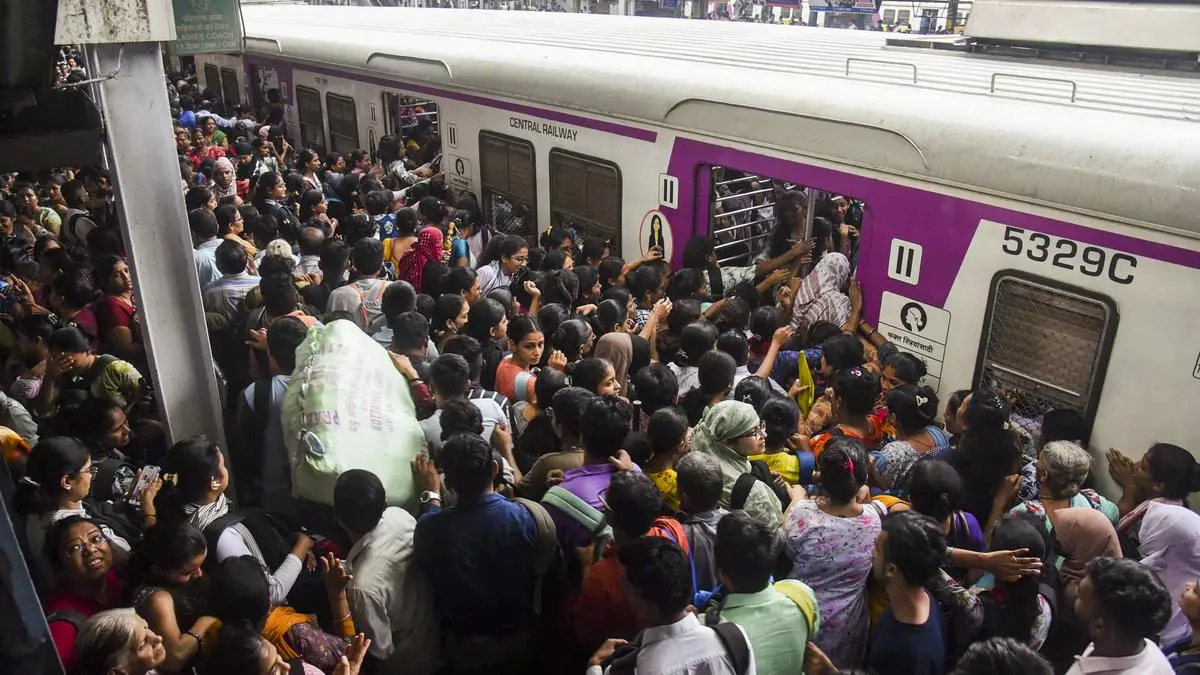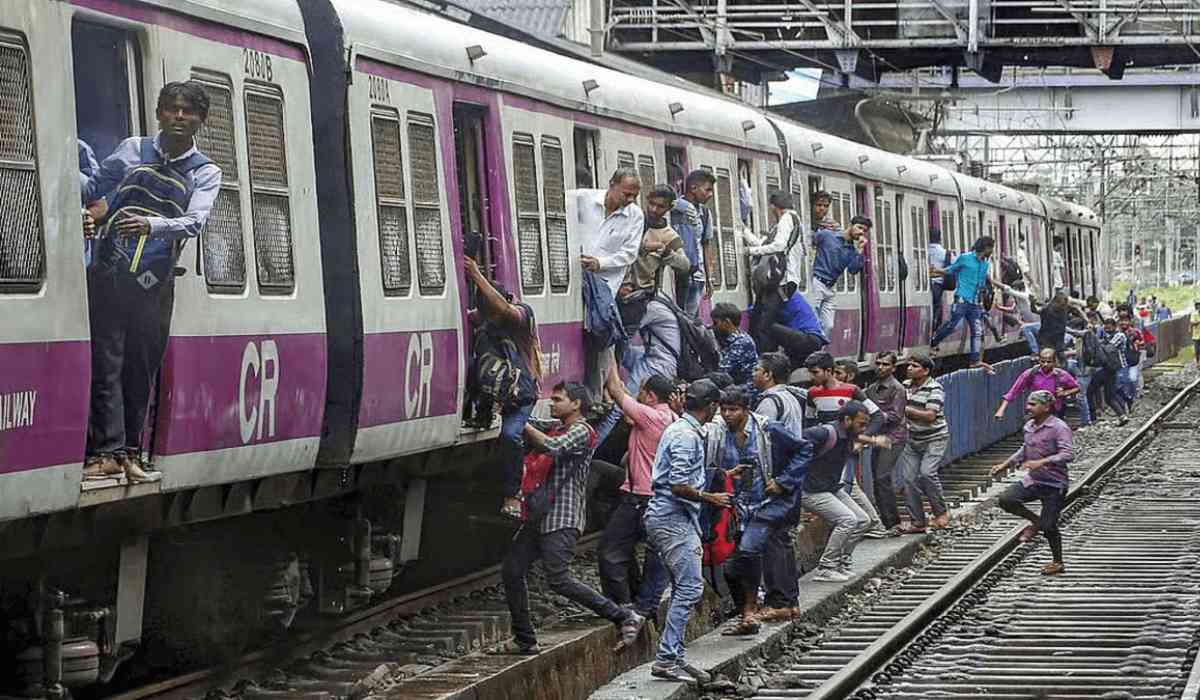In a tragic incident that has reignited concerns over passenger safety on Mumbai’s suburban rail network, four passengers lost their lives and six others sustained injuries after falling off a Thane-bound local train on Monday morning. The train was heading toward Kasara from Chhatrapati Shivaji Terminus (CST) when the accident occurred.

Time and Place of the Accident
-
Route: Chhatrapati Shivaji Terminus (CST) to Kasara
-
Location: En route to Thane, exact stretch undisclosed
-
Time: Around 9:50 AM during peak commuter hours
The tragedy happened during peak rush hours, a period known for severe overcrowding on local trains. As per Thane Police, the deceased passengers were aged between 30 and 35 years.
Immediate Response and Rescue Operations
Following the accident, railway officials and emergency personnel reached the scene swiftly. The injured passengers were transported to a nearby hospital, facilitated by ambulances arranged by the Central Railway authorities.
According to Central Railway's Chief Public Relations Officer (CPRO), Swapnil Neela, the train guard alerted officials immediately after the fall, prompting a rapid response:
"Eight people had fallen on the track. An ambulance was arranged by the Railway to send them to the hospital. It reached around 9:50 AM. These people were travelling on the footboard of the local train."
Chief Minister Reacts: "Extremely Unfortunate"
Maharashtra Chief Minister Devendra Fadnavis expressed deep sorrow over the incident, calling it "extremely unfortunate". He assured the public that the Railways will conduct a thorough investigation into the circumstances that led to the deaths.
VIDEO | Mumbai local train deaths: Giving information about the deaths that happened after falling from a Mumbai local train due to overcrowding, Central Railway CPRO Swapnil Neela assures that they there would be trains with automatic door closure facility soon to avert such… pic.twitter.com/gwelOr4nLR— Press Trust of India (@PTI_News) June 9, 2025
Cause of the Accident: Overcrowding and Unsafe Travel
Initial findings point towards overcrowding as the primary cause. It has been reported that the passengers who fell were travelling while hanging onto the doors of the coach— a common but hazardous practice in Mumbai’s packed local trains. These footboard travelers are especially vulnerable during sharp turns, sudden braking, or jostling caused by the crowd.
Railway’s Response: Automatic Door Closers Announced
In response to the tragedy, the Indian Railways has announced a significant safety upgrade aimed at preventing similar incidents in the future. According to Central Railway’s CPRO, automatic door closure systems will soon be a standard feature in all new and existing Mumbai Suburban Railway rakes.
Key Measures Announced:
-
Automatic Door Closers: All rakes currently under manufacturing for Mumbai's suburban network will be equipped with automatic door closing mechanisms.
-
Rake Redesigns: Existing rakes will be redesigned and retrofitted with door closure facilities.
-
Implementation Timeline: While specific dates haven’t been disclosed, the Railway authorities have confirmed that the transition is already in progress.
“New trains that are coming will have automatic door closure facilities to avert such incidents,” added CPRO Swapnil Neela.

Political Reactions and Demands for Probe
The incident has sparked political and public outcry. Shiv Sena MP from Thane, Naresh Mhaske, has demanded a formal investigation into the causes behind the tragic fall.
Key Questions Raised:
-
Was the fall purely due to overcrowding?
-
Were the passengers pushed or involved in an altercation?
-
Was there a mechanical or operational failure?
Speaking to a regional news outlet, Mhaske emphasized the need to identify the root cause:
“The cause of the incident needs to be addressed. How did they fall...was there a crowd, were they pushed, was there a fight?”
Mumbai Locals: Lifeline with Challenges
Mumbai’s local train network is often dubbed the "lifeline of the city", ferrying over 7.5 million passengers daily. However, chronic overcrowding, aging infrastructure, and insufficient safety mechanisms have made such incidents alarmingly frequent.
Common Risks Faced by Commuters:
-
Footboard Travel: Due to lack of space, many passengers are forced to hang onto doors or ride on footboards.
-
No Door Mechanism: Unlike Metro trains, most suburban trains have manual doors or no automatic closure, making it easy for passengers to fall.
-
High-Speed Sections: Some stretches of the suburban network have trains travelling at high speeds, increasing the risk for footboard travelers.
The Way Forward: Addressing Safety at Scale
While the announcement of automatic door closure systems marks a significant step forward, experts believe that infrastructure upgrades must go hand-in-hand with commuter education and capacity expansion.
Recommended Measures:
-
Increase Train Frequency: To reduce overcrowding during peak hours.
-
Platform Safety Campaigns: Educate passengers on safe travel practices.
-
Upgrade Existing Trains: Accelerate retrofitting of old rakes with door closers and emergency mechanisms.
-
Real-Time Crowd Monitoring: Deploy AI and surveillance tools for real-time congestion tracking and intervention.
The Mumbai local train accident that claimed four lives and injured six has not only highlighted the urgent need for enhanced safety features but also sparked a broader conversation around the structural limitations of Mumbai's overburdened suburban rail system. As the Indian Railways prepares to roll out modern door safety mechanisms, this incident must serve as a catalyst for holistic reform, prioritizing commuter safety over sheer capacity.
With inputs from agencies
Image Source: Multiple agencies
© Copyright 2025. All Rights Reserved Powered by Vygr Media.






















